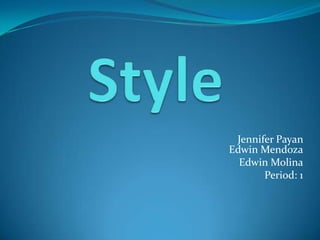
Style-Their Eyes Were Watching God
- 1. Jennifer Payan Edwin Mendoza Edwin Molina Period: 1
- 2. Style? Style is the writer’s distinctive manner of arranging words to suit his or her ideas and purpose in writing. Elements of style include: Syntax Diction Tone Figurative Language Imagery Point of View Organization Musicality Rhyme Use of Time Repetition
- 3. What is Point of View? Point of View, is the way a story is written. Point Of View depends on who is telling the story. There are several types of Point of Views. There are 3 point of views. They are First Person, Second Person, and Third Person.
- 4. What’s the difference? First person is told by the main character perspective. The author uses pronouns like “I” and “Me” to describe a character. Second Person this is almost never seen. The author writes the story using the pronouns “you” to describe the main character. Third Person is the most common type of Point of View. The author uses the character’s names like “he” or “she” to describe a character.
- 5. Their Eyes are Watching God Point of View Author begins the story by, Janie tells her story to her friend Pheoby Watson. The telling takes only part of an evening. The rest of the story continues, but it is not a first- person point . The author quickly takes over the telling and uses third-person point of view.
- 6. Tone An author’s tone is the “voice” or attitude toward the subject of the story and/or reader. The author reveals tone through word choice.
- 7. Tone In Their Eyes Were Watching God The overall tone for “Their Eyes Were Watching God” is sympathetic.
- 8. Sympathy in Their Eyes were Watching God Chapter 3: “She knew now that marriage did not make love. Janie’s first dream was dead, so she became a woman.” (pg. 25) Chapter 6: “Janie loved the conversation and sometimes she thought up good stories on the mule, but Joe had forbidden her to indulge. He didn’t want her talking after such trashy people.” (pg. 53-54)
- 9. Figurative Language Figurative language is when you describe something by comparing it with something else. Figurative language includes metaphor, simile, symbol, anecdote, allusion, and other types of figures of speech.
- 10. Chapter 4 Example “The morning road air was like a new dress.” (Ch. 4, pg. 32) This is an example of a simile. This example reveals the hope Janie still has for herself after leaving Logan.
- 11. Chapter 5 Example “She must look on herself as the bell-cow, the other women were the gang.” (Ch. 5, pg. 41) This is an example of a metaphor. This example describes how Janie had to work in the store as if she were of a higher class than anyone else. It also reveals how Janie was different from the other women because she was Joe’s wife. She’s compared with a cow bell due to the fact that she feels special because in her mind she is superior to everyone else.